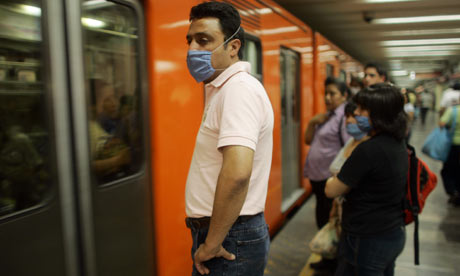
People wear surgical masks as a precaution against infection on the Mexico City subway. Photograph: Miguel Tovar/AP
Health officials across the world scrambled to contain the outbreak ofswine flu today as the death toll in Mexico rose and new suspected cases emerged in other countries as far apart as Scotland and New Zealand.
The World Health Organisation said at least 81 people had died from severe pneumonia caused by the illness in Mexico, and tests on suspected cases were also taking place in Scotland, France and Spain.
The US declared a public health emergency as 20 cases were confirmed in the country, including eight in New York City, one in Ohio, two in Kansas and seven in California. The acting director of the Centres for Disease Control and Prevention, Dr Richard Besser, said he expected more cases over the coming days.
The homeland security secretary, Janet Napolitano, said the US government was releasing 12m doses of the anti-flu drug Tamiflu from a federal stockpile.
The World Health Organisation (WHO) said that the virus had "pandemic potential", but the world was better prepared than ever to withstand a pandemic. It stopped short of issuing a worldwide alert.
Keiji Fukuda, acting WHO director general for health security and environment, said: "I believe that the world is much, much better prepared than we have ever been for dealing with this kind of situation."
Two people were this afternoon admitted to a Scottish hospital after returning from Mexico with flu-like symptoms, the Scottish health secretary said today.
Nicola Sturgeon said the pair – who flew back to Scotland on April 21 – had not been in an area affected by recent outbreaks of swine influenza. "The patients have displayed mild flu-like symptoms and their current condition is not causing concern," she said.
The health secretary, Alan Johnson, said Britain was on "constant alert".
French health ministry officials said four possible cases of swine flu were under investigation: a family of three in the Nord region and a woman in the Paris region. The four recently returned from Mexico. Tests on two separate cases of suspected swine flu proved negative, they said.
Spain's health ministry said three people who had just returned from Mexico were under observation in hospitals in the northern Basque region, in south-eastern Albacete and the Mediterranean port city of Valencia.
The New Zealand government announced today it was "likely" that 10 students who had recently returned from Mexico had contracted the virus.
In London, tests showed that a cabin crew member on a British Airways flight from Mexico City did not have swine flu. The man, who was not named, was taken to hospital in London yesterday with "flu-like symptoms" after landing at Heathrow.
A hospital spokesman said: "I can confirm he does not have swine flu. All the tests have come back negative."
A Health Protection Agency spokesman said: "No cases of swine flu have been identified in the UK or anywhere in Europe."
Mexican authorities ordered the closure of schools in the capital city and the states of Mexico and San Luis Potosí until 6 May. Soldiers and health workers patrolled airports and bus stations, looking for people showing symptoms of the illness, which include a fever of more than 100F and coughing.
The Mexican government yesterday issued a decree authorising President Felipe Calderón to invoke powers allowing the country's health department to isolate patients and inspect homes, travellers and baggage. The health secretary, José Angel Córdova, said: "We are very, very concerned."
People in Mexico City were ordered not to kiss or shake hands yesterday. Football matches went ahead without spectators; theatres, shops and museums were closed; staff were inside locked schools scrubbing classrooms with disinfectant; and health workers patrolled buses, ordering sickly-looking people home.
Any doubts over the extent of the emergency were dispelled last night by the sight of soldiers handing out blue surgical masks to pedestrians and motorists along Mexico City's central boulevard, Paseo de la Reforma. With TV and radio calling on the population to seek medical advice for any flu-like symptoms, queues grew at clinics and hospitals across the city.
Calderón said specialist laboratories in Canada had confirmed the outbreak was of a type of virus labelled A/H1N1 not previously seen in pigs or humans. Few of the cases appear to have had any contact with live pigs.
The WHO said the virus appeared to be able to spread from human to human and contained human virus, avian virus and pig viruses from North America, Europe and Asia.
Given how quickly flu can spread, there might be cases incubating around the world already, said Dr Michael Osterholm at the University of Minnesota: "Hundreds and thousands of travellers come in and out [of Mexico] every day."
At Mexico City's international airport, passengers were questioned to try to prevent anyone with flu symptoms from boarding aircraft and spreading the disease. The Foreign Office issued a warning to UK travellers about the outbreak, but stopped short of recommending people not to visit Mexico. US health officials took a similar line, urging visitors to wash their hands frequently.
Passengers on a plane from Mexico City were kept on board at Heathrow airport for 45 minutes today while they were questioned by health officials. Two inspectors boarded British Airways flight 242 to ask passengers and crew if they felt unwell.










